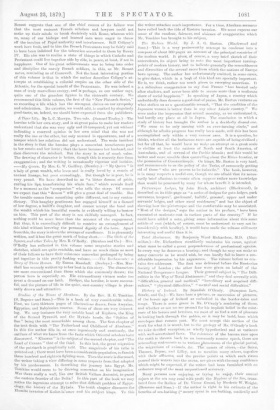A Tiger Lily. By L. C. Mervyn. Two vols. (Samuel
Tinsley.)--The heroine tells her own story, and is at great pains to make her readers understand that she was very ugly and ill-tempered, yet not without indicating a reserved opinion in her own mind that she was not really the one or the other, but only unusual in appearance, and of a temper which her relatives did not understand. The main incident in the story is that the heroine plays a somewhat treacherous part to her cousin and her lover ; that the lover becomes her husband, and then discovers the misdeed. But the story is not of much value. The drawing of character is better, though this is scarcely free from exaggeration ; and the writing is occasionally vigorous and incisive.
Queen. By Mrs. G. W. Godfrey. (Bentley.)—" My Queen " is a lady of great wealth, who loves and is really loved by a cousin of ancient lineage, but poor exceedingly. But though he is poor, ho is very proud. We have described to us "a bitter demon of pride, curling his lips, transforming his whole face," which reveals itself for a moment as the " companion " who tells the story% Of course we expect that this " demon " will give a groat deal of trouble. But the trouble comes from something quite different, not to say contra. dictory. This haughty gentleman has engaged himself to a damsel of low degree, a bailiff's daughter, and cannot' accept the hand and the wealth which his beautiful cousin is evidently williug to bestow on him. This part of the story is not skilfully managed. In fact, nothing could be more lame than the account of the engagement. But then, it is exceedingly difficult to contrive an entanglement of this kind without lowering the personal dignity of the hero. Apart from this, the story is above the average of excellence. It is pleasantly written, and it has the great merit of being short.—The Girls of the Square, and other Tales, by Mrs. R. O'Reilly. (Strahan and Co.) - -Mrs. O'Reilly has collected in this volume some magazine stories and sketches, which are quite readable, and have as much claim as most of their fellows to have their existence somewhat prolonged by being put together in this pretty•looking volume.—The Rochemonts : a Story of Three Homes. By Emma Marshall. (Seeleys.)—Mrs. Mar- shall has scarcely written up to her best in this story. The characters are more conventional than those which she commonly draws; the parson hero is especially so. His extraordinary virtues make too great a demand on our faith. Bridget, the heroine, is more success- ful, and the picture of life in the quiet, east-country village is pleas- antly drawn and attractive.






























 Previous page
Previous page